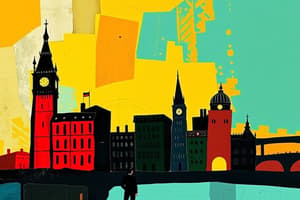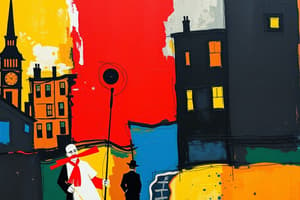Podcast
Questions and Answers
In addition to the cook, how many servants does Monseigneur need to serve his morning chocolate?
In addition to the cook, how many servants does Monseigneur need to serve his morning chocolate?
four attendants
What is Monseigneur's 'one truly noble idea of general public business'?
What is Monseigneur's 'one truly noble idea of general public business'?
It meant to let everything continue on its own, benefiting him personally.
What is 'the one unfailing talisman and charm used for keeping all things in their places'?
What is 'the one unfailing talisman and charm used for keeping all things in their places'?
Dress
What does the last person left at Monseigneur's say about him?
What does the last person left at Monseigneur's say about him?
How is the last person described, and what kind of man is he based on these details?
How is the last person described, and what kind of man is he based on these details?
What causes Monsieur the Marquis' carriage to stop?
What causes Monsieur the Marquis' carriage to stop?
According to Dickens, how does the Marquis perceive the commoners gathered around his carriage?
According to Dickens, how does the Marquis perceive the commoners gathered around his carriage?
What condemnatory statement does the Marquis make about what has happened?
What condemnatory statement does the Marquis make about what has happened?
What does he offer as recompense for the man's loss?
What does he offer as recompense for the man's loss?
Whose child was it?
Whose child was it?
Who comforts the father?
Who comforts the father?
What advice does he offer the father to ease his pain?
What advice does he offer the father to ease his pain?
What happens when the Marquis starts to drive away?
What happens when the Marquis starts to drive away?
What is the Marquis' response?
What is the Marquis' response?
Who is the only one in the crowd to stare directly into the Marquis' eyes?
Who is the only one in the crowd to stare directly into the Marquis' eyes?
What earlier chapter is set up as a direct contrast to this one?
What earlier chapter is set up as a direct contrast to this one?
What is Dickens' attitude toward the Monseigneur?
What is Dickens' attitude toward the Monseigneur?
What is the overall tone of the chapter?
What is the overall tone of the chapter?
What point is Dickens making in the metaphor about 'the leprosy of unreality'?
What point is Dickens making in the metaphor about 'the leprosy of unreality'?
At the end of the chapter, to what does Dickens compare Madame Defarge?
At the end of the chapter, to what does Dickens compare Madame Defarge?
How does the chapter's title reflect its content?
How does the chapter's title reflect its content?
What word does Dickens repeat in his description of the village?
What word does Dickens repeat in his description of the village?
To whom does the Marquis speak when his carriage stops in the village?
To whom does the Marquis speak when his carriage stops in the village?
Why had the man been staring so intently at the Marquis' carriage?
Why had the man been staring so intently at the Marquis' carriage?
Who is Monsieur Gabelle?
Who is Monsieur Gabelle?
What petition does the forester's wife make of the Marquis?
What petition does the forester's wife make of the Marquis?
What question does the Marquis ask when he arrives at his chateau?
What question does the Marquis ask when he arrives at his chateau?
Where have we heard a similar name earlier in the novel?
Where have we heard a similar name earlier in the novel?
Discuss the symbolism/significance of the following quotation: "The sunset struck so brilliantly..."
Discuss the symbolism/significance of the following quotation: "The sunset struck so brilliantly..."
Which motif from earlier in the novel is repeated at the end of this chapter?
Which motif from earlier in the novel is repeated at the end of this chapter?
How does the chapter's title reflect its content?
How does the chapter's title reflect its content?
Whose arrival is the Marquis awaiting?
Whose arrival is the Marquis awaiting?
Who arrives to meet with the Marquis?
Who arrives to meet with the Marquis?
What is implied about this man's name?
What is implied about this man's name?
How does Charles explain the reason he came back to France?
How does Charles explain the reason he came back to France?
How do we know the Marquis is likely trying to stop Charles from succeeding in his purpose?
How do we know the Marquis is likely trying to stop Charles from succeeding in his purpose?
According to Charles, why has the Marquis not succeeded in gaining a letter de cachet?
According to Charles, why has the Marquis not succeeded in gaining a letter de cachet?
What does the Marquis claim is the 'only lasting philosophy'?
What does the Marquis claim is the 'only lasting philosophy'?
What exactly was 'the last request of [Charles'] dear mother's lips'?
What exactly was 'the last request of [Charles'] dear mother's lips'?
What does Charles intend to do with the property in France whenever he inherits it?
What does Charles intend to do with the property in France whenever he inherits it?
How do we know the Marquis is familiar somehow with the Manettes?
How do we know the Marquis is familiar somehow with the Manettes?
What happens to the Marquis at the chapter's end?
What happens to the Marquis at the chapter's end?
What is on the note found with the Marquis?
What is on the note found with the Marquis?
Where have we seen reference to that name before?
Where have we seen reference to that name before?
Discuss the difference in the way the Marquis and Charles view the family's position and power.
Discuss the difference in the way the Marquis and Charles view the family's position and power.
Discuss what is revealed about the Marquis by the quotation: 'Detestation of the high is the involuntary homage of the low.'
Discuss what is revealed about the Marquis by the quotation: 'Detestation of the high is the involuntary homage of the low.'
What is the reference to 'farming' in a metaphorical sense in this chapter?
What is the reference to 'farming' in a metaphorical sense in this chapter?
Discuss the irony of the Marquis' words: 'My friend, I will die, perpetuating the system under which I have lived.'
Discuss the irony of the Marquis' words: 'My friend, I will die, perpetuating the system under which I have lived.'
How does the chapter's title reflect its content?
How does the chapter's title reflect its content?
How much time has passed since the Marquis' death?
How much time has passed since the Marquis' death?
How is Charles earning a living?
How is Charles earning a living?
What is Dr. Manette's condition/state of mind on most days now?
What is Dr. Manette's condition/state of mind on most days now?
What are the similarities between Charles and Dr. Manette?
What are the similarities between Charles and Dr. Manette?
What is the promise Charles asks of Dr. Manette?
What is the promise Charles asks of Dr. Manette?
What does Charles wish to tell Dr. Manette?
What does Charles wish to tell Dr. Manette?
Reread Dr. Manette's words to Charles in this scene; what do they indicate about his character?
Reread Dr. Manette's words to Charles in this scene; what do they indicate about his character?
Why do you think Dickens refers to Dr. Manette as the 'Doctor of Beauvais' at this particular time?
Why do you think Dickens refers to Dr. Manette as the 'Doctor of Beauvais' at this particular time?
When Lucie returned home, what is the banging sound she hears?
When Lucie returned home, what is the banging sound she hears?
How does the chapter's title reflect its content?
How does the chapter's title reflect its content?
Flashcards are hidden until you start studying
Study Notes
Chapter 7-10 Summary
- Monseigneur requires four servants to serve his morning chocolate, reflecting his luxurious lifestyle.
- Monseigneur's philosophy on public business revolves around self-interest, prioritizing personal gain and power.
- The concept of dress serves as a "talisman" for maintaining appearances and control among the aristocracy.
- The last servant observes that Monseigneur focuses on extravagant banquets rather than the welfare of the French people, highlighting his self-serving nature.
- The Marquis St. Evremonde, Charles Darnay's uncle, is depicted as cruel and immoral, relishing in the suffering of commoners.
- The Marquis's carriage halts after striking a child; he responds callously, showing a complete disregard for people's lives.
- The Marquis's perception of the commoners is negative, viewing them as obstacles rather than human beings.
- The Marquis casually tosses a gold coin at the grieving father, Gaspard, for the child's death, exemplifying his indifference.
- Gaspard's child had previously been seen in earlier chapters, connecting personal grief with a broader context of social injustice.
- Monsieur Defarge attempts to console Gaspard, representing the empathetic perspective of the common populace amid aristocratic apathy.
- Defarge suggests that the child’s death frees him from a painful existence, contrasting the Marquis's view of life.
- Someone from the crowd throws back a coin at the Marquis's carriage, symbolizing the growing resentment among the oppressed.
- Madame Defarge silently knits while staring at the Marquis, foreshadowing her involvement in future revolutionary events.
- Dickens suggests that the aristocrats are blind to the suffering in their country, encapsulated in the metaphor of "the leprosy of unreality."
- The chapter's tone reflects the arrogance of the nobility, with the Marquis rebuffing common folk and their concerns.
- The chapter ends with Madame Defarge's ominous act of knitting, possibly foreshadowing violence and revolution.
- The title reflects the chapter's focus on the appearance of order maintained by members of the aristocracy.
Chapter 8 Highlights
- The repetition of "poor" emphasizes the dire conditions of common villagers, illustrating the economic disparity created by the aristocracy.
- When his carriage stops, the Marquis dismisses a villager's claim of a man hanging from the carriage, demonstrating his disconnection from reality.
- Monsieur Gabelle, a tax collector tormented by revolutionaries, seeks Darnay's help, indicating the escalating tensions in France.
- The plight of a grieving widow who seeks wood for her husband's grave highlights the injustices faced by the poor.
Chapter 9 Key Points
- The Marquis awaits his nephew Charles Darnay, suggesting a complex family dynamic and tensions related to their different philosophies.
- During their meeting, Darnay expresses regret for the suffering caused by their family, contrasting deeply with the Marquis's cynical outlook.
- Darnay's decision to renounce his inheritance and pursue a more compassionate life highlights the generational conflict within the Evremonde family.
- The Marquis's belief that "repression is the only lasting philosophy" reflects the oppressive mindset of the aristocracy, indicative of broader societal issues.
Chapter 10 Summary
- A year has passed since the Marquis's murder, signifying a significant shift in the narrative's timeline.
- Charles Darnay earns a living teaching French, emphasizing his connection to the common people and contrasting his uncle's opulence.
- Dr. Manette displays signs of mental fragility, which provides insight into his character's ongoing struggles after imprisonment.
- Darnay seeks Dr. Manette's assurance not to oppose his love for Lucie, illustrating the theme of familial loyalty and love against past traumas.
- Lucie's return home triggers Dr. Manette's shoe-making habit, signifying a regression towards his trauma and the lingering effects of his imprisonment.
- The chapter's title underscores the dual promises made, reflecting the intertwined fates of Darnay and Dr. Manette amidst their shared burdens.
Studying That Suits You
Use AI to generate personalized quizzes and flashcards to suit your learning preferences.




